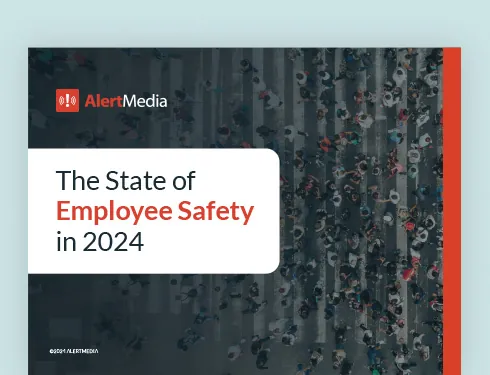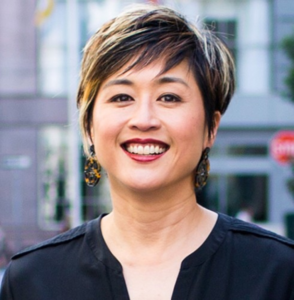
Jenn Lim on Creating Workplace Happiness
Jenn Lim, Co-Founder, CEO, and Chief Happiness Officer at Delivering Happiness shares how companies can build a workplace culture where employees can experience meaningful happiness and feel psychologically safe.

As The Great Resignation continues, investing in your employees and their happiness is more important than ever.
Jenn Lim, Co-Founder, CEO, and Chief Happiness Officer at Delivering Happiness, recently joined us on The Employee Safety Podcast to discuss how companies should build a workplace culture where employees can experience meaningful happiness, feel psychologically safe, and personally align with the company’s core values.
Delivering Happiness started as a book that sold one million copies worldwide and was a New York Times and Wall Street Journal bestseller. It later evolved into a business consultancy that Jenn co-founded with Tony Hsieh (the late CEO of Zappos) to create happier company cultures for a more profitable and sustainable approach to business.
Delivering Happiness is now a global movement that has impacted and inspired hundreds of companies and organizations worldwide. Jenn also helped create the world’s first series of Culture Books at Zappos, and she has been featured in Forbes, Fortune, Entrepreneur, and more.
You can listen to the episode below.
Q&A With Jenn Lim, Co-Founder and CEO of Delivering Happiness
Can you tell us about the origin story of Delivering Happiness?
After college, I became an internet consultant during the dot.com boom of the late 90s. Everyone knows the story, but shortly after the internet boomed, the industry busted. The same year that I got laid off, we all endured 9/11 and I found out my dad had stage-three colon cancer. All of these events made me realize that I was chasing money, title, and status—and it didn’t mean anything compared to family and health. I started exploring my purpose and values and that’s when I met Tony Shay, the late CEO of Zappos. What I loved about the direction Tony was going with Zappos was exploring how to bring positivity to the business. I aligned with that, and we were geeking out on positive psychology and the data and research that was being done on it. That’s how Zappos grew.
The goal was to become a billion-dollar company in ten years, and Zappos became a billion-dollar company in eight years. This was largely due to those principles of positive psychology and focusing on people. We were focused on culture before it was a buzzword. As I look back, the methods and frameworks that we developed were the geneses of Delivering Happiness as a “coachsultancy,” as we call ourselves. Today, we use the same model for organizations around the world.
Let’s talk more about those methodologies and frameworks. Can you give us the highlights?
Throughout The Great Resignation and the changing work landscape, we’ve seen that the best companies align their profits with their purpose. It’s a competitive advantage that allows organizations to grow and succeed. It also allows companies to reinvest in their people so that employees can align their own purpose with that of the company.
“"The best companies align their profits with their purpose."”Jenn Lim, Co-Founder and CEO of Delivering Happiness
Delivering Happiness has been in business for eleven years now, and throughout that time, we’ve seen that there’s a demand for more meaningful happiness—not just in work but in life. It’s been great to see how organizations around the world are implementing this concept. From the government in Dubai to companies in Egypt and Vietnam, it’s amazing how one simple but meaningful concept can have such an enormous impact.
Can these frameworks apply to organizations of any size or industry?
I’ve been looking for trends in terms of who wants to work with us and how we can help them, and time and time again, there’s no one trend of size or industry. The trend is that leaders want to invest in this not just for themselves, but for the people that they impact. So that’s been the most interesting part of this, is seeing how universal happiness can be.
What do you say to naysayers or doubters of your philosophies?
I actually love talking to them the most! It sounds cliche about happiness being contagious, but when you explain to a CFO that by investing in their employees, their teams will stay longer, they’ll be more engaged, and be more productive, they get it. The bottom line is that if your salespeople are happier, they sell more. People are an investment, not an expense. When employees feel taken care of, they will invest back in the company with hard work, productivity, engagement, and loyalty. The companies that are a Best Place to Work have actually outperformed SMP 500 companies for the last fifteen years, at least. When companies double down on people, it comes back to them financially.
Was there an “aha!” moment in your career that led you to your calling of transforming workplace culture?
There were a lot of “aha’s” of what I didn’t want in a company. The top reason people leave their job is their team or manager. It’s really about who you work with, and I think it’s important to surround yourself with positive teammates, friends, and family. The other part of that is understanding yourself and your own purpose and values to keep growing.
Do you have any examples of organizations you’ve worked with that experienced positive outcomes from applying your methodologies?
We consult organizations of all different sizes and industries, but one of my favorite examples is our work with Northwell Health—New York State’s largest healthcare provider and private employer, with more than 74,000 employees. We worked with them before the pandemic to develop their core values and align hundreds of executives, thousands of employees, and all hospitals within their system to ensure everyone in the company knew what their mission and values were. During the pandemic, Northwell Health rose from #90 to #19 in the ranks of Best Places to Work. Their frontline workers, nurses, doctors, and all employees were supported from the top down. That was the most inspirational and tactical thing that I’ve seen. When you take care of your people and make sure they are physically and psychologically safe, you can develop a successful organization while helping your community grow.
In your book, you talk about the Greenhouse Model. Can you explain that to our audience and how they can apply it to their organizations?
As leaders, we all want to grow our teams, our profits, and our companies. However, we often forget about growing ourselves and nurturing our own greenhouse. That includes our mental, emotional, and physical well-being, as well as our sense of purpose. The Greenhouse Model serves as a reminder that to help others grow and learn, we must first nurture and take care of ourselves.
In your opinion, what other skill sets are important for leaders to thrive in a workplace culture of happiness?
Adaptive intelligence is an important skill for any leader. A lot of the time, we work with companies where C-levels or board members are not walking the talk, and it shows. Adaptive intelligence is about controlling what you can and embracing what you can’t. We can control our purpose and values and how we spend our day, so ask yourself if you’re doing it meaningfully and for the right reasons. Adaptive intelligence starts with being accountable for yourself.
What advice do you have for business leaders to best respond to these changes and better support or retain their employees?
To respond to The Great Resignation, we have to ask why it’s happening. Even though there’s a lot of chaos around us, people are taking the time to be true to both their highs and their lows. It’s important to understand those low moments and not sweep them under the rug because a person’s true character comes out during a crisis. Similarly, a company’s true character comes out in a crisis through its culture and how they treat their people. In many ways, The Great Resignation has been a blessing for people and humanity. Everyone is a bit more aware of doing the right thing, even if it’s not profitable or for success.
What are the most common reasons you’re seeing people leaving a company for?
Pay and managers are still top reasons, but during this Great Awakening, we’re also seeing flexibility and autonomy as determining factors for employees to stay or leave their company. Autonomy is actually one of the scientific levers of happiness—everyone needs a sense of control in their lives. The other element employees are seeking is a higher purpose. The pandemic gave us all time to evaluate whether we are spending our time meaningfully and living as we truly want to.
When it comes to flexibility, how do you coach managers to give their people more flexibility?
Now that everyone has had a taste of remote or hybrid work, most people are not going to go back. As a manager or a leader, it’s important to open up the conversation and democratize what it means to be flexible. Some people want to get back in the office, and others need a different structure to be productive. It is a challenge for leaders, but it’s the reality of work today. People want to feel heard and understood, and if they don’t, they will find somewhere else to work.


![11 Steps to Creating an Effective Emergency Response Plan [+ Template]](https://www.alertmedia.com/wp-content/uploads/2023/10/Blog-Emergency-Response-Plan.webp)


